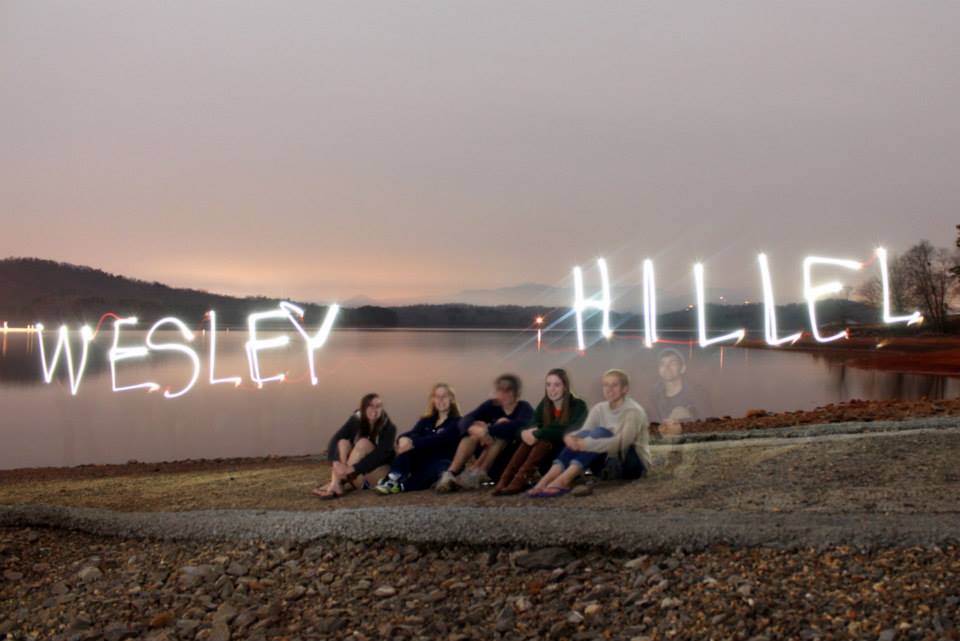
The first day of our spring break trip I noticed how Christian-centric my Facebook feed is. Relaxing after the first achy work day, waiting for dinner, we’d only had one group conversation at that point, but already I was seeing things a little differently.
Rabbi Jake Rubin and I have been colleagues and friends for a few years and we’d casually said, “We should do a trip together sometime.” Last summer we got less casual about it and decided to bring our student leaders into the conversation. After the first meeting, standing in the parking lot talking a bit more, our main Wesley spring break organizer said, “I expect to be challenged and to learn a lot.” We talked about that being a great orienting stance for our group and she expressed the concern that everyone from Wesley would need to be on the same page – this is a service trip together, not an opportunity to convert the Jews. (For the record, we didn’t have any students interested in doing this.)
Saying “service trip” instead of “mission trip” was one of the first things we noticed. The Brody Jewish Center – Hillel at UVA usually refers to their trips as Alternate Spring Break trips and when we asked we realized “mission” has a resoundingly Christian ring to it. So we worked on our language a bit and referred to our joint venture as our “Interfaith Spring Break Service Trip.” Those of us at Wesley started to think more deeply about what we communicate by saying “service trip” or “mission trip.” For many years in our pre-trip meetings, Wesley has stressed the theological understanding that we don’t “bring God” to anyone – we go to see what God is already doing there. Adjusting our language this year helped us to see this even better.
We also adjusted our schedule. Hillel usually travels to and from service trips on Sundays, observing Sabbath in place from Friday night to Saturday night. In the past we have usually traveled back home on Saturday. Making room for Sabbath also meant volunteering some place we felt comfortable just hanging around in on Saturday without the distractions of work. We ended up choosing the Hinton Rural Life Center, a United Methodist organization with whom we’d volunteered previously. I called them before we registered to go over the particulars of our trip (longer stay, Sabbath, more dietary needs) and to be sure they were as comfortable with and excited about our interfaith venture as we were. The Hinton location had a lot of what we needed to make things work and from our previous Wesley experience we also had a sense the staff would welcome and support the unique nature of this year’s group. We were right and their staff – everyone from the chef to the executive director – went out of their way to make it a great week.
Jake and I were committed to having actual interfaith conversations, not merely watered down “spiritual” talks unconnected to either tradition. One of the best parts of our week were several evening conversations we had, led by Jake and using the Ask Big Questions framework. These were excellent in helping us connect our work in North Carolina with our beliefs, questions, and developing relationships with one another. “Big Questions” like “For whom am I responsible?” and “What do we choose to ignore?” focused our conversations and gave everyone permission to speak from the heart. There are no right or wrong answers to the big questions themselves so students were free in their responses and generous in their listening to one another.
For me, the highlights of the week were our worship services on Thursday and Friday nights. During the rest of the week we offered interfaith prayers but on Thursday we had a Christian worship service with Communion and on Friday we had a Shabbat service and celebrated the beginning of the Sabbath before we shared dinner. Following each worship service was an open time of conversation, reflection, and questions. Wesley folks were surprised to hear Hillel folks point out how much we talk about love and God’s love in our worship. Jewish students expressed longing to sing together the way we did in the Christian service, though Christian students were surprised at this reaction since almost the entire Shabbat worship was sung. After each worship service we talked for at least an hour together. Fearing we might be going on too long after the Thursday night worship, I offered that perhaps we should close the conversation. One of the Jewish students said, “I don’t have anywhere better to be,” and we talked for another 45 minutes.
Midway through the week I’d already had several Wesley students come up and tell me it was the best trip they’ve been on. One said, “A lot of my Christian friends from other groups wondered why were are doing this. I have learned so much and I have so much to tell them now.” One of the Jewish students reflected on observing Jake and me, “The two leaders of two different religious communities have engaged in constructive discussions of religion without fighting—something that I do not often encounter.”
Like my Facebook feed realization, that student’s reflection caught me off guard. I was surprised to hear that something as simple and civil as two people talking respectfully was such an anomaly. For our two groups, at least, it won’t be. We are hoping to make this part of an ongoing tradition, every 2 or 3 years.
*
photo credit: © 2014 Aaron Stiles. Used with permission.
